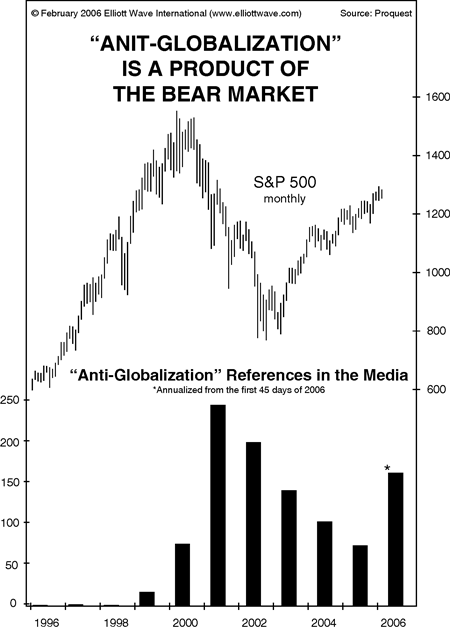"The anti-globalization movement is subversive", declared Premier Silvio Berlusconi answering journalist questions on protests before the start of Winter Olympics in Turin. "Something like this has never happened before", he stated after the inauguration of a section of the Roman ring road, "I think what unfortunately is happening here today has not been seen for the last 2,700 years."
AGI, February 9, 2006
Antiglobalization protesters of a high-speed rail link between Turin and Lyon, France, forced a detour in the Olympic torch route last week because officials feared a repeat of this winter's mobfest. In December, a torch bearer nearly had the Olympic flame hijacked when protesters closed in. Italy's interior minister, Giuseppe Pisanu, reportedly told Vatican radio on Tuesday, ''More than Islamic terrorists, for the Olympics I fear the rising aggressiveness of antiglobalization protesters, anarchists and all the domestic subversion movement.''
The New York Times, February 9, 2006 |
| April 2007 |
| S |
M |
T |
W |
T |
F |
S |
|
1
|
2
|
3
|
4
|
5
|
6
|
7
|
|
8
|
9
|
10
|
11
|
12
|
13
|
14
|
|
15
|
16
|
17
|
18
|
19
|
20
|
21
|
|
22
|
23
|
24
|
25
|
26
|
27
|
28
|
|
29
|
30
|
|
|
|
|
|
|
|
 |
|
« Previous |
Main Page
| Next »
|
Berlusconi: Anti-Globalization Movement Subversive
By: Pete Kendall, February 15, 2006 |
Cambodia’s commerce secretary says, “Everything is dividing.’’ Added the former head of Argentina’s central bank, “Everyone is questioning globalization.” Globalization, universally regarded as good and proper in 1998, is today the focus of intense public opposition. The anger against it is so strong that trade meetings have to be held in obscure hamlets that can be sealed off from the outside world. This is an apt metaphor for the prospects of these negotiations and a clear signal that the bear market is far from over.
The Elliott Wave Financial Forecast, July 2003 |

The chart tells the story. The very concept of anti-globalization barely even existed until 1999, the last year of the bull market. In fact, of the 17 references to anti-globalization appeared in that year, all came in the last 40 days of the year, which was within a few days of the all-time peak in 2000. In 1996, 1997 and 1998 when the bull market was still in force, there were a total of four references to anti-globalization in newspapers and trade journals.
Included in those references was a 1996 article calling “into question the widespread and seemingly inevitable globalization of Western business practices into every corner of the planet.” The article challenged “the assumption that host countries will necessarily benefit from globalization” and stimulated “critical thinking and reflection about globalization's origins, cultural sensitivity, fairness, sources of power, and future impact on the well-being of the planet.” Using a variation of "deconstruction" and notions of post-modernism” the article laid the foundation for “an emancipatory anti-globalization praxis for teaching and consulting.” It’s philosophical and practical framework for a move against the forces of globalization was completely ignored.
But then in 2000 this chart shows that something happened as the volume of anti-globalization references rose dramatically. The represention of the S&P at the top of the chart explains exactly what it ws, a dowturn in social mood as represented by the trend in stock prices. As the bear market set in, the previously unchallenged idea of global interdependency based on changes in technology and free trade was cast in a negative light for the first time. Notice that the biggest years so far for anti-globalization references were 2001 and 2002 when the S&P experienced the meat of its bear market losses. Notice also that after falling as the market rallied in 2003, 2004 and 2005, the anti-globalization buzz is on the rise again.
As the Italian prime minister surmises, the opposition to economic and cultural exchange for its own sake is probably unique to history. When street level disturbances by anti-globalization forces re-directed the Olympic torch several times Berlusconi asked “Italians not to harm themselves” trying to block its route to the Olympic site. “Otherwise Italy would appear to be the only country in the world not wanting the Olympic Games.” The Olympics will probably come off relatively well because many averages are still riding high. In the future, however, the viability of Olympics is likely to be become much more tenuous as the antipathy toward events and institutions founded on a belief in the brotherhood of nations grows much stronger.
|
|
|
Additional References
See December 13 and December 20 entries for additional references. |
|
Post a comment
|
|
|
 |
| RECENT ARTICLES |
 |
April 16, 2007
Does Imus Cancellation Radio a Bear Market Signal?
read more |
April 12, 2007
One Small Coffee Shop Uprising for Starbucks, a Grande Leap for Labor
read more |
April 11, 2007
Dazzling Finish: Cars Bring Once-Boring Shades To Life
read more |
April 10, 2007
T in T-Line Stands for Top
read more |
April 5, 2007
The Fight for a Free Vermont? Must be a Big, Big Turn
read more |
|
|
| ARTICLE COMMENTS |
 |
|
|
|
|
